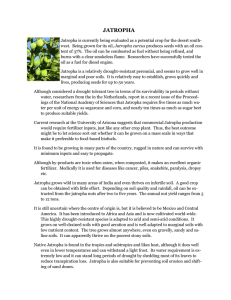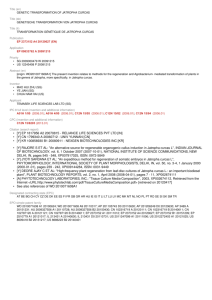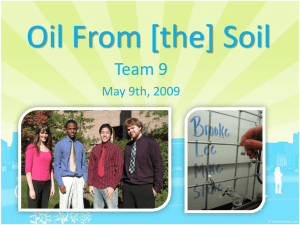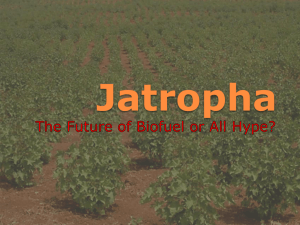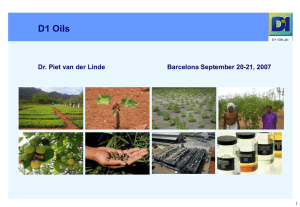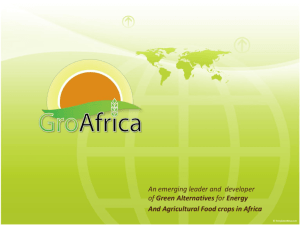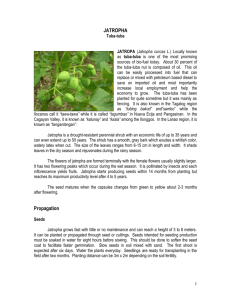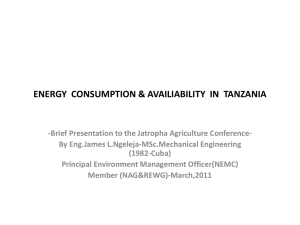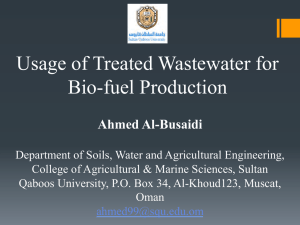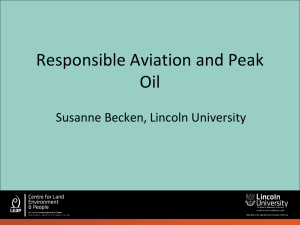Folie 1
advertisement
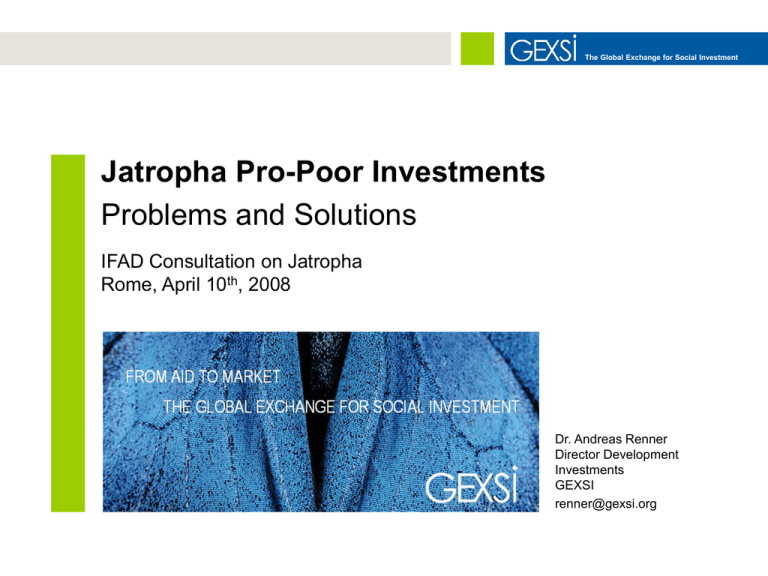
The Global Exchange for Social Investment Jatropha Pro-Poor Investments Problems and Solutions IFAD Consultation on Jatropha Rome, April 10th, 2008 Dr. Andreas Renner Director Development Investments GEXSI renner@gexsi.org The Global Exchange for Social Investment Our background: Enhancing pro-poor investments GEXSI assists social entrepreneurs and social purpose businesses in developing countries to move „from aid to market“ by MARKET Commercial Investments Degree of self-reliance Providing technical expertise in business planning and investment structuring Locating financing that meets the needs of the enterprise in accordance with its business development stage – arranging for below-market or full-fledged commercial investments Facilitating networking, mentorship and exchanges of information and expertise GEXSI focus Civil Voluntary Organizations and Micro-Entrepreneurs often depend on grant funding AID Grant Funding Social businesses with solid business model and track record are valid for commercial investments €500k-2m Hybrid social organizations require investments at below-market conditions €50k-500k €10-50k TIME The Global Exchange for Social Investment Jatropha Learning Network Since 2005, GEXSI has started to build up a jatropha learning platform which will be further refined in 2008: Coaching and Mentoring of local jatropha entrepreneurs in Asia, Africa, and Latin America Pro-poor investing: Project Development and Implementation of a 300 ha jatropha pilot plantation in Madagascar, designed as a social venture Research: Facilitation of Exchange of Know-How between Projects Sustainability: GEXSI is a founding Member of the Multi-Stakeholder Dialogue on Sustainable Jatropha Netherlands Germany India Guatemala Gh an Camer a Peru oon Brazil Nam ibia Network + Field Research & Pilots Learning Network R&D Partners Laos Tanzania Madagascar Mozambique Philippines Indonesia The Global Exchange for Social Investment Global Market Study on Jatropha GEXSI has been contracted by WWF to undertake a stock-taking on the development of jatropha projects – worldwide. As of today, we have Identified and processed data of 288 jatropha projects Interviewed more than 170 experts in 54 countries We have prepared 40 country profiles and 6 case studies We currently evaluate the data and finalize the report. Preliminary Results The Global Exchange for Social Investment Jatropha has been discovered as a future energy crop and will be farmed at large scale strong commercial activities (> 5000 ha) low or no commercial activities (< 100 ha, not increasing) starting commercial activities (100-5000 ha, increasing) not researched Preliminary Results The Global Exchange for Social Investment Asia takes the lead in terms of acreage. Scale of cultivation: 2008: 26,866 ha 2015: 1,640,250 ha *Expert Country Estimates Number of projects identified: 41 Total size of projects identified: 20,906 ha Scale of cultivation: 2008: 938,999 ha 2015: 9,072,093 ha *Expert Country Estimates Scale of cultivation: 2008: 71,215 ha 2015: 1,067,028 ha Number of projects identified: 91 *Expert Country Estimates Number of projects identified: 96 Total size of projects identified: 89,537ha Total size of projects identified: 1,645,583 ha Preliminary Results The Global Exchange for Social Investment Jatropha cultivation is supported by a growing number of governments Governmental support for Jatropha cultivation and investments: exists – through other means strong - through legislation or other means not reported currently drafted or discussed Jatropha is banned The Global Exchange for Social Investment Assessment Currently, the financial sector invests billions of USD in Jatropha projects worldwide This development takes place with or without governments or international organizations taking an active role. The key question is whether the cultivation models which are chosen, will benefit the rural poor What organizational and cultivation schemes prevail? Preliminary Results The Global Exchange for Social Investment Will Jatropha be grown in a sustainable manner? Sustainability Issues: Food, Rainforest Food versus Fuel – conflict is not seen as major issue for jatropha Rainforest: Conflicts mainly seen in South-East Asia Project Data Expert Interviews 17% 65% 34% 24% 8% Cultivation affects primary forest Cultivation affects food production Cultivation mainly on marginal land Primary Forest 1 not at all 1 not at all 1 not at all Secondary Forest 2 2 2 Agriculture (food) 3 3 3 Agriculture (non-food) 4 4 4 None / Wasteland 5 very much 5 very much 5 very much Percentage of projects which referred to type of use Global aggregated data of interviews Preliminary Results The Global Exchange for Social Investment Smallholder outgrowers play an important role Inclusion of smallholder farmers takes place in most regions and independent from project type and size Only very few pure outgrower schemes in Latin America Africa Asia 36% Plantation Outgrower Combination Latin America 22% 2% 44% 34% 28% 52% 39% Project Data (aggregated) 51% The Global Exchange for Social Investment Critical issue: Smallholders may lose out Expert Interviews indicate that there may be a shift towards pure plantation models due to failure of outgrower schemes. Problems Opportunity costs: What are incentives to participate if there are no harvests in the first 23 years? Loyalty: How to ensure that the participating farmers actually sell to the organization which set up the scheme? Agronomy: Difficulty to provide efficient pest control etc. There exist numerous different organizational / institutional approaches; need for further test trials and showcases! Preliminary Results The Global Exchange for Social Investment Case Study India – high percentage of smallholders Expert estimates: In 5 year‘s time, 38% of the total acreage of jatropha cultivation in India will be small-scale production of <5ha, compared to only 25% Asia overall Strong governmental support Buy-pack policy at guaranteed prices Grant support schemes Regional Distribution Most suitable areas Uttaranchal 2008 – 350 ha 2012 – 200,000 ha Guarantee Price – 0.14 US$ Selected projects Haryana 2008 – 328 ha 2012 – 20,000 ha Rajasthan 2008 - 33,000 ha 2012 - 220,000 ha Available Waste Land - 5,6m ha Guarantee Price - 0.11 US$ Tamil Nadu 2008 – 20,277 ha 2012 – 100,000 Available Waste Land – 1,8m ha Guarantee Price - 0.12 US$ Down-side: Need for continued grant support Chhattisgar 2008 - 84,000 ha 2012 – 1,000,000 ha Available Waste Land: 1m ha Guarantee Price– 0.13 US$ Andhra Pradesh 2008 - 15,715 ha 2012 - 1,500,000 ha Available Waste Land - 4,4m ha Guarantee Price - 0.14 US$ Preliminary Results The Global Exchange for Social Investment Only market based solutions work in the long run Work with the market player in order to enhance the inclusion of smallholders. Public Private Partnerships as a promising path. Worldwide India 64% 38% 31% 17% 19% Indicative Figures (double aggregation) 31% Private Public PPPs Preliminary Results Integration of smallholder farmers: Elements of a strategy Work with (social) businesses who have a long-term interest in further developing the outgrower scheme; allow for growth over time. Provide Coaching and Mentoring of Farmers (via „techniciens“ etc.) Involve Microfinance Institutions as partners whereever appropriate Advanced purchase agreements: Reliability more important than price Integrate scheme in agronomic calendar of outgrowers The Global Exchange for Social Investment The Global Exchange for Social Investment What could IFAD do in order to enhance pro-poor jatropha developments? 1 Promote Field Research: Provide financing to monitor promising approaches of existing projects; make benchmark on outgrower models which work 2 Provide below-market rate of return financing to early stage social jatropha businesses („from aid to market“ approach) 3 Liaise „good projects“ (which meet IFADs standards) with existing development finance schemes and/or provide first-loss guarantees for funds investing in jatropha businesses Make those projects flourish that have an entrepreneurial spirit, a social vision and a strong management team. The Global Exchange for Social Investment JATROPHA PLATFORM We are in the process of further expanding our jatropha related services Find our global jatropha study at our new web-site (from 1 May 2008 onwards) Contact us for further questions: Andreas Renner renner@gexsi.org www.jatropha-platform.org
